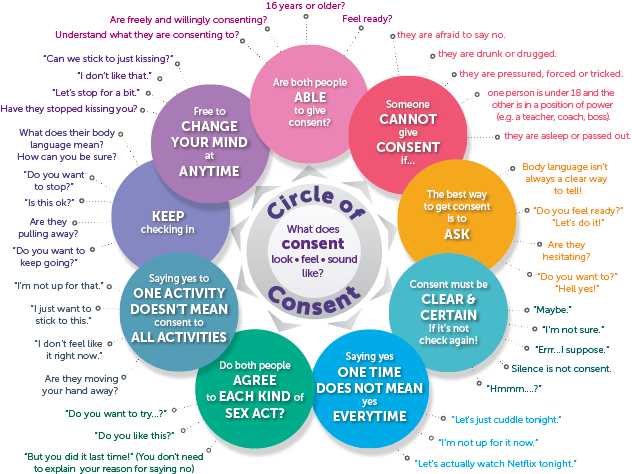Breadcrumb
Preparing young people for healthy sexually active lives
Preparing young people for healthy sexually active lives
Providing opportunities to talk about sex will help young people to make informed decisions that will keep them safe, happy and healthy.
Navigation Menu
What is sexual consent?
Asset Publisher
What is sexual consent?

In this section
How do I explain sexual consent?
Sexual consent is an agreement to engage in sexual activity.
Consent must be:
- mutual
- freely given
- informed (i.e. they understand what they are agreeing to)
- ongoing (i.e. gained at each step of physical intimacy)
- certain and clear.
Without consent, sexual activity is sexual assault.
The following downloadable diagram outlines some of the basics of consent and offers some discussion starters for you and your teen.
You might try asking questions like,
If someone says/does…have they consented?
How can someone be sure?
Conversation starter:

What are some of the ways that someone can communicate they have consented to sex?
What could you do if you were unsure if someone had consented?
What does the law say?
- Sex is when a penis, finger, object or any part of a person is fully or partially inside another person’s vagina or anus.
- Sex also includes any kind of oral sex.
- Consent means giving your free and voluntary agreement to sex.
- It is never OK for someone to assume you have given consent or to force you to keep going if you want to stop.
- In Western Australia, the legal age for consent to sexual activity is 16 years or older.
- This means that you can have sex with another person aged 16 years or older so long as you both agree to it.
- It is a crime for a person who is caring for you, supervising you or has authority over you to have sex with you if you are under 18 (e.g. teacher, employer, coach, carer).
- A person cannot give consent (regardless of age) if:
- they are drunk or drugged
- they are unconscious or asleep
- they have a mental or intellectual condition that impacts on their ability to understand what they are consenting to
- they are tricked, forced, coerced or threatened.
- Sexual assault is any unwanted sexual act or behaviour a person did not consent to or was not able to consent to. This can include:
- unwanted sexual touching, kissing, hugging
- making you watch a sexual act, such as porn
- being forced to perform any sexual act.
- Sexual harassment is any unwelcome sexual behaviour that makes a person feel uncomfortable, offended, humiliated or intimidated.
- This can happen at school, at work or in other places and can be in person or through social media.
- This can include:
- unwelcome sexual advances
- requests for sexual favours
- sexual jokes
- staring, leering
- wolf-whistling
- physical contact (e.g. unwanted touching).
-
Youth Law Australia is a great website for young people wanting further information on laws that relate specifically to them.
-
It is important to know that many laws differ from state to state (and country to country).
Read next:
You might also be interested in:
Consent resources, Growing and developing healthy relationships
2 minutes will change the way you think about consent, CampusClarity (USA) A video created by young people teaching consent through the analogy of asking to borrow someone’s phone.

